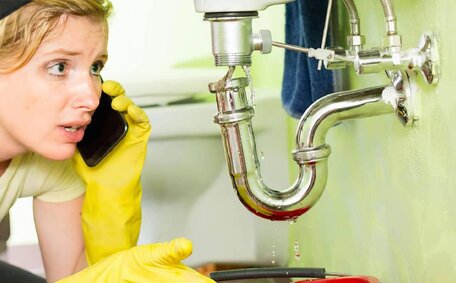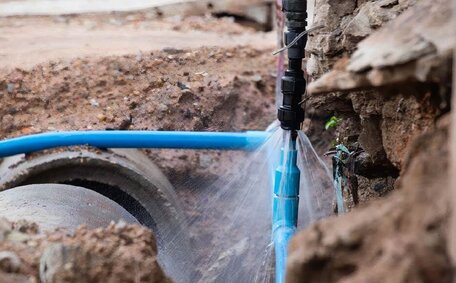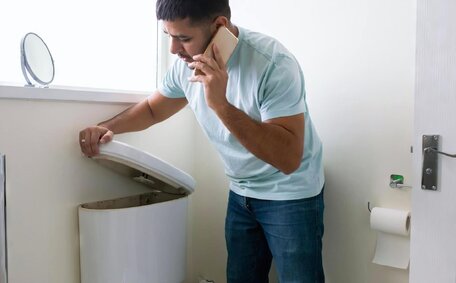Introduction to Common Plumbing Materials
Selecting the right pipes is essential for a dependable and safe plumbing system in your home. The type of pipes used impacts longevity, prevents leaks, and provides clean water throughout your home.
This article will discuss the various pipes among residential plumbing supplies to help homeowners understand their options when installing or replacing pipes.
We’ll explore PEX, copper, PVC, stainless steel, galvanised steel, and cast iron pipes, detailing their benefits and limitations.
Key Factors In Selecting Plumbing Pipes
When selecting plumbing materials, it’s essential to equip your home with the right type of pipes, considering several important factors:
Cost
Consider the cost versus value of different plumbing pipes, such as PEX, to ensure economical and effective installation in your home. PEX and PVC pipes tend to be best plumbing choices for your home when evaluating cost-effectiveness as a defining criterion. Copper pipes might carry a higher initial outlay, but they offer performance and lifespan benefits that are more than worth the investment.
Durability
Material durability is key to deciding on pipe longevity; choose those that withstand your specific usage conditions. Copper pipe touts exceptional corrosion resistance due their commendable composition, though PVC might become brittle and fracture as years pass. PEX pipes are durable and flexible, suitable for a variety of plumbing needs.
Compatibility
Select pipes and fittings that seamlessly fit into your existing plumbing system for hassle-free integration. When choosing materials like PEX, it may require additional connectors or fittings.
PEX’s simplicity in installation saves time and effort, compared to other more complex materials. Make sure to consider when evaluating your skill level and whether professional help is needed.
Local Building Codes
Remain vigilant when reviewing your local plumbing codes to guarantee adherence and ensuring you can use suitable plumbing pipe types. Some types may need to meet certain standards.
Pipe Durability
Pipe durability is how long your pipes will last before replacement is needed, a crucial component of their lifespan. Heftier materials endure the passage of time better, providing pipes that can weather leaks, cracks, or corrosion with more resilience than PEX.
These kinds pipes, such as copper and PEX, are recognised for their remarkable sturdiness, each with lifespans surpassing 50 years and resilience to UV light, positioning them as one of the most suitable choices for household plumbing necessities. Know your materials: the malleable nature and corrosion resistance of copper is due to its superior properties, making it very durable. PEX’s outstanding pliability is a testament to its quality, making them especially suitable for geographic areas prone to soil displacement, gracefully enduring shifts without succumbing to cracks.
PVC pipes, common in bathroom plumbing, last 10-30 years, while iron pipes can last much longer due to superior durability. Galvanized steel pipes and steel cast iron materials can deteriorate through corrosion over time; still, cast iron may endure beyond 30 years, albeit presenting repair challenges.
When assessing residential durability, copper pex materials are one of the most reliable options; consider factors like:
- Water characteristics - Soft, neutral pH water is less corrosive.
- Piping location - Outdoor pipes need maximum weather/sunlight resistance.
- Usage intensity - Extreme conditions such as high water strain that only types that can withstand low water pressure may accelerate the wear on pipes.
Copper and PEX are top choices for durable plumbing options well-suited for Australian homes, whereas PVC is better for certain indoor applications.
Ease of Installation
The installation ease of various plumbing pipes that match your water system requirements is an important factor to consider. Flexible plastic piping like PEX is the easiest residential pipe type to install as it can bend around corners without splits or leaks.
PEX, commonly used in domestic plumbing including with tankless water heaters, involves cutting the pipe to size and connecting it with push-fittings. This push-fit method allows easy installation without requiring clamps, glue or soldering. PVC pipes can easily be utilised with relative ease by DIYers looking to install.
Conversely, rigid copper pipes pose a challenge in installation. Copper can necessitate meticulous manipulation and bending of pipes, coupled with impeccably soldered connections. If executed inadequately, missteps can cause the emergence of leaks or fissures over the years.
Hiring a professional plumber is advisable for first-time copper installations to ensure correct techniques. They have the specialised tools and experience for precision bending and joining.
Although flexible pipes like PEX are easier to install, specific requirements may necessitate using types like copper for a customized plumbing system. Consider brass piping if it fits your criteria for ease of installation as its also impacting overall project cost and duration.
Applications - Potable Water vs Drainage
Identifying whether pipes are for potable water or waste disposal is critical when choosing supplies for residential or commercial applications. Using pipes designed for clean drinking water as a water supply line on drainage applications can be hazardous.
Stainless steel, PEX, and copper, which meet health standards for drinking water, are preferred choices for water supply in homes. These materials are non-corrosive and do not contaminate the water, ensuring a safe supply for residential use.
Conversely, drainage systems often use cast iron pipes, which are effective for sewage and greywater effluent, meeting functional requirements. Materials like PVC and cast iron are very common for waste plumbing, as they are cheaper but durable enough to contain effluent safely.
- PEX – Best for flexible central plumbing and maintaining a consistent hot cold water supply.
- Copper – Ideal service lines bringing water into the home.
- PVC – Most cost-effective for drainage systems.
- Stainless Steel – Usually used for kitchen sinks and appliances with superior corrosion resistance.
Consider water pipes when selecting materials which allows homeowners to allocate suitable materials to each system based on priorities like health, corrosion resistance and safe containment.
Comparing PEX, Copper, PVC, and Other Options
PEX
PEX is a popular plumbing option due to its flexibility, ease of installation, affordability, and good durability. It is suitable for both hot and cold water lines, making it a good choice for water heater connections as well, and The lack of rigid joints allows PEX to shift with soil movement, which can make it less prone to cracking.
PEX, a staple of modern home plumbing, comes in white, red and blue colours to denote hot and cold lines. It has a smooth inner wall that resists buildup and corrosion. PEX pipes are also suitable for high demand residential water applications, providing a reliable supply of hot and cold water, aside from exterior supply lines.
Copper
Copper is one of the most durable materials with long-lasting corrosion resistance due its premium properties, making it an excellent choice for residential plumbing systems. The only downside is the material and installation costs are higher, especially for DIYers, as it requires precision tools, bending and soldering skills.
Ideal uses for copper include central plumbing manifolds, water supply lines coming into your house, appliance connections and gas water lines where its rigidity suits the application. Copper pipes have soldered joints and usually come in L or M shapes.
PVC
PVC (polyvinyl chloride) pipes are the most cost-effective option for residential drainage systems. Although they lack longevity compared to metal pipes, PVC is designed for drainage waste disposal, handles effluent well, and the installation process with solvent cement glue is straightforward. However, there’s no case where PVC should be used for hot water lines or supply piping.
It best suits underground drainage systems, vent stacks and some indoor waste lines. PVC is available in grey and cream colours based on local waste plumbing codes.
Other Options
Stainless steel pipe offers excellent corrosion resistance for kitchen sinks, appliances and some specialised plumbing applications. Galvanised steel is affordable but lacks long-term durability compared to other materials, while cast iron piping suits drainage systems in multi-story buildings well.
Overall PEX, copper and PVC together can cover 80-90% of typical residential plumbing system needs with specialty piping used where appropriate based on the application.
Health and Environmental Considerations
It’s crucial to evaluate the health and environmental impact of plumbing materials when making selections.
Older materials, like lead pipes, can leach toxins into drinking water, presenting significant health hazards. Any older homes with remaining lead piping should arrange for it to be replaced. Contemporary pipes such as PEX, copper, and stainless steel are safe and meet present-day health guidelines.
Some plastic pipes can release volatile organic compounds over time which may affect water quality and indoor air purity. PVC contains chlorine so it’s unsuitable for potable water systems. PEX piping, made of a safer, inert plastic, is a preferable option.
From an environmental perspective, Copper and stainless steel are highly recyclable materials made out of valuable resources. PEX is moderately recyclable whereas PVC is difficult to recycle and could end up in landfills.
Overall the recommended approach is to select pipe materials approved for potable water use while preferring options with better durability and recyclability to minimise lifetime waste and environmental impact.
Installing and Maintaining Your Plumbing System
Installing Your Plumbing System
Choosing the correct plumbing fixtures and fittings when installing new pipes is key to avoiding future issues. For complex jobs like major re-plumbing, engaging a professional plumber is wise; however, DIY is doable for simple tasks such as fitting new taps or replacing exposed pipe sections.
Select high-quality plumbing fittings and joining methods that are appropriate for the pipe material chosen. For example, use push-fittings for PEX pipes or soldered joints on copper. Proper installation includes securing the pipes well, using isolation valves for maintenance access, and gradient runs for wastewater drainage.
Maintaining Your Plumbing
Regular plumbing maintenance can prevent leaks and faults, and when deterioration is evident, consider pipe replacement to maintain water quality and supply. A yearly inspection and pipe condition assessment is advisable to prevent issues that could potentially damage your home’s plumbing system.
Isolating and pressure testing pipes checks for unseen weaknesses prone to future leakage. Pipe finishes can deteriorate so look for erosion, rust and joint integrity issues. Finally, confirm water supply valves, taps, and appliances are functioning optimally.
Carrying out minor maintenance yourself like checking fittings, clearing drains or installing aerators can also optimise the lifespan of your plumbing system.
Choosing a Plumbing Professional
Expertise is required when installing or replacing plumbing systems to ensure proper techniques, regulatory compliance, and lasting reliability. While minor DIY plumbing tasks are achievable, we strongly recommend hiring professional Northmead plumbers for extensive pipework in your home.
Our certified plumbers boast years of experience in selecting and fitting the ideal pipes for Northmead homes’ plumbing needs. We stay up-to-date with the latest methods and materials to deliver reliable results you can trust.
Key benefits of choosing Northmead Plumbing include:
- Compliant installations – We follow all applicable Australian Standards and codes.
- Latest plumbing products available – We use and recommend quality copper, PEX or PVC pipes from leading brands.
- Precision techniques - Our specialists have the tools and skills for error-free jointing.
- We address the root cause of leaks and faults, not just temporary fixes.
For expert plumbing installations, bathroom upgrades, or maintenance, email us or call 1300 349 338 to arrange a consultation with our respected Northmead plumbing professionals.






